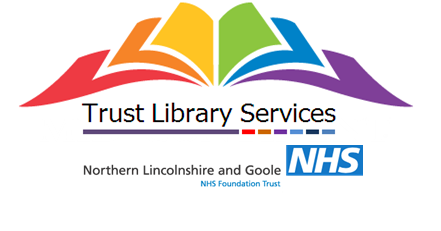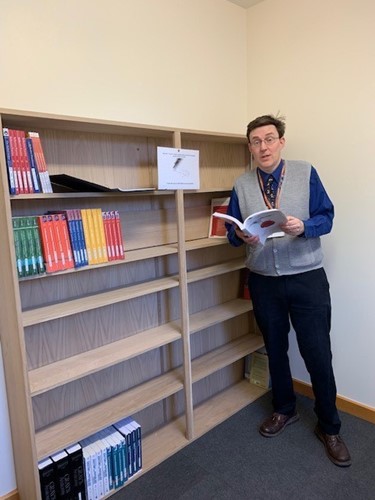
Like other services, we were running at full tilt, and then lockdown happened! However, we have not let this deter us. Here are some details of our activities over the last year:
Goole Hospital Resource Room
Goole Hospital has never had a library, and back in the old days of the MADEL contracts (if you have been in your job as long as I have you will remember those), it was considered that a library was not necessary at the Goole site because junior doctors were not placed at Goole; and neither were medical students or nursing students for that matter.
However, within Trust Library Services, we have always recognised that there is a need for all of our hospital sites to have access to our resources and expertise. Naturally, this has been easy to achieve via our e-resources and in addition to this, books have been posted out to users at Goole. A small office had been assigned to Trust Library Services in the past, but was in a very shabby state; and over the last year we decided to do something about this in order to make Trust Library Services more of a presence in Goole Hospital.
After successfully bidding for some refurbishment and resource monies, the resource room was fully refurbished, a new computer added, and book stock added as requested by some of the nursing and therapy staff groups. It is now a pleasant environment for Goole Hospital staff to retire to in order to update themselves and carry out course and CPD activities.
We are also preparing to bid for a shared Library Graduate Trainee post (shared with Library and Knowledge Management Services at Hull University Teaching Hospitals) with the aim of giving the post holder some experience of outreach work at Goole Hospital. This will greatly enhance our service offer to Goole Hospital, and we are excited about being able to achieve this.

Chris Lawton in the process of adding new stock to the newly refurbished resource room at Goole Hospital
Supporting Trainee Advanced Clinical Practitioners (ACPs) with Coffee and Cake and how this led to some research about supporting systematic reviews
In December 2019, we held an informal coffee and cake session to which we invited a group of trainee Advanced Clinical Practitioners as the Trust’s first cohort of trainees had reached its final year. We wanted to ascertain the impact of our services on this group, and whether we needed to re- design any of our services in order to be more supportive.
Key areas where we have had an impact have been in saving staff time, keeping them informed and up to date, and helping develop new clinical approaches, a specific example of how we assisted in a new pathway being developed for lumbar punctures within the Trust was particularly gratifying.
There are other things that we have done like afforded pastoral support and a ‘safe haven’ to study in. However, an unexpected consequence of supporting the trainees to prepare for the literature review stage of their dissertations was how there can be a mis-communication about what a systematic review entails. Our service had generally been receiving an increased demand for help with systematic reviews, but the trainees started to ask for this too. This led to us carry out some research into what was happening in the burgeoning world of systematic reviews and how our very small team could help. It emerged that when people request systematic review assistance, the interpretation of what they mean by ‘systematic review’ is key, and this topic combined with how we can support ‘true’ systematic reviews was published in a paper in April on the LKS North blog called:
Which has hopefully helped other LKS staff to navigate the tricky path of establishing whether someone seeking a systematic review is dealing with a ‘true’ systematic review, as we understand it. Combined with ideas for how we best support systematic reviews/literature reviews when we only have small staff teams.
Undertaking a vast re classifying project in lockdown
Our Trust was formed in 2001 and since then our library service has grown from the merger of the libraries based in Grimsby and Scunthorpe hospitals. We were aware that there were some distinct differences in certain areas of our classification of some subject areas of book stock between the two sites, but were put off by the scale of tackling this disparity…until lockdown!
Our senior library assistants have been busy identifying the differing classifications with a view to us agreeing a new uniformity to assist our users. Lockdown has had some positives, although we are not too sure that the senior library assistants will agree with that!
A growing KnowledgeShare presence
Throughout the past year we have seen substantial growth in library users signing up to KnolwedgeShare. Users have particularly wanted to make use of the current awareness aspect of the service. This is quite gratifying for us as on initial launch of the service we did not have a huge take up. By being proactive and targeting specific groups of staff to inform about the benefits of the service we have seen a much better response rate.
One of the key things this has enabled us to do is target groups that are remote from ourselves. For instance, the Podiatry service at our Trust is remote from the main body of the hospital. Targeting them led to many signing up for updates. Also, from this we have strengthened ties with their department and seen in a sharp rise in requests for article requests and literature searches from the podiatrists themselves.
Dealing with Covid-19 has had some positive impacts on our service
Every library service has had to face the unusual challenges presented by the Covid-19 virus this year and ours has been no different in that respect. However, we have also been able to see this as an opportunity.
We were able to sign more people up to KnowledgeShare who wanted to keep up with specific updates on this. Alongside this we also took the opportunity to collate and distribute updates from a range of sources. Including other health libraries, Evidence Based medicine centres and HEE updates. This meant that the library could raise its profile by offering time critical information to a range of stakeholders within the organisation.
Dealing with the virus has also afforded an opportunity to strengthen bonds within the library team. We are a multi-site library meaning that staff do not usually necessarily interact on a daily basis if they are on their ‘home’ sites. However, during a lengthy period of home working we made a point of being in daily contact.
That daily online contact – centred mostly around email chats has been supplemented by weekly virtual meets and catch-ups. This has been an excellent way to keep all staff members abreast of rapidly changing circumstances. It has also afforded staff who may usually be separate from one another to get to know each other better. There is real sense that the team has a greater empathy and that through understanding each other better we have strengthened the bonds of the team.
Home Working has not stopped us
One of the most gratifying aspects of the shift to predominantly home working over the past few months is how flexible and responsive we have been able to be in continuing to provide a service. For instance, article supply and literature searching have continued with no discernible drop off in demand from our users.
Alongside this we have found workable solutions to helping people. For example, early in lockdown we had a request from a user undertaking an MBA for a textbook. We were able to source and supply it to them directly without them coming to the library.
We have also modified much of our induction packs working alongside local universities and our own Post Graduate Medical Department. This means that they can now be delivered remotely as currently required by our partner organisations. This is an extension of the way we have adapted to signing new members up to the service remotely and have been providing a service at a distance up to this point.
As we return to some semblance of normality it will be interesting for us, and no doubt other services, to see how much more blended our service offers become.
Jo Thomas, Trust Library Services Manager
Chris Lawton, Specialist Librarian for e-Resources
July 2020

